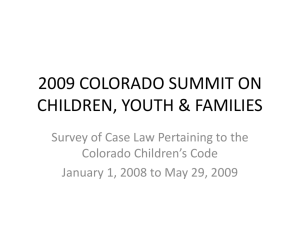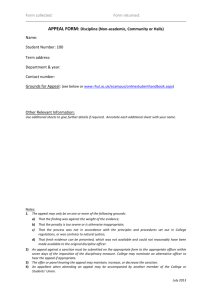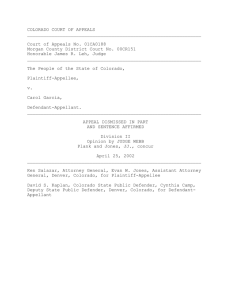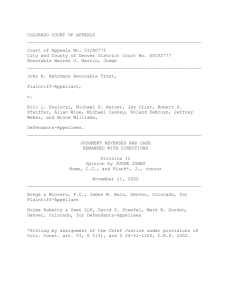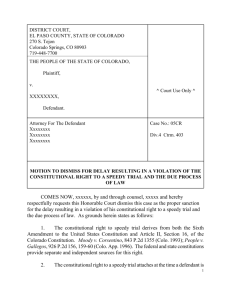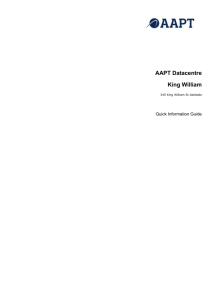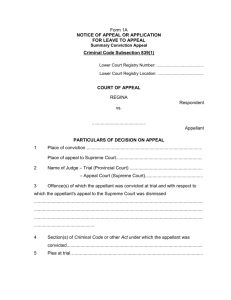record reconstruction notes
advertisement
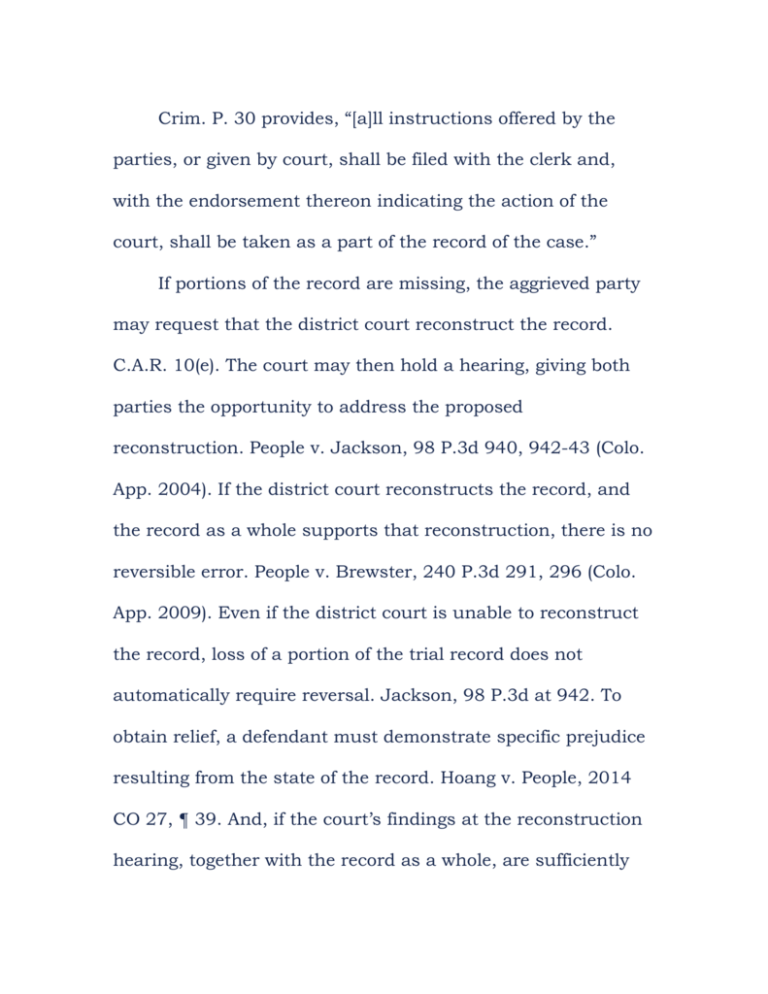
Crim. P. 30 provides, “[a]ll instructions offered by the
parties, or given by court, shall be filed with the clerk and,
with the endorsement thereon indicating the action of the
court, shall be taken as a part of the record of the case.”
If portions of the record are missing, the aggrieved party
may request that the district court reconstruct the record.
C.A.R. 10(e). The court may then hold a hearing, giving both
parties the opportunity to address the proposed
reconstruction. People v. Jackson, 98 P.3d 940, 942-43 (Colo.
App. 2004). If the district court reconstructs the record, and
the record as a whole supports that reconstruction, there is no
reversible error. People v. Brewster, 240 P.3d 291, 296 (Colo.
App. 2009). Even if the district court is unable to reconstruct
the record, loss of a portion of the trial record does not
automatically require reversal. Jackson, 98 P.3d at 942. To
obtain relief, a defendant must demonstrate specific prejudice
resulting from the state of the record. Hoang v. People, 2014
CO 27, ¶ 39. And, if the court’s findings at the reconstruction
hearing, together with the record as a whole, are sufficiently
reliable to permit us to conduct an intelligent review of the
defendant’s contentions, reversal is not required. Id.; People v.
Ellis, 148 P.3d 205, 207-08 (Colo. App. 2006).
Our review of the record regarding the court’s
reconstruction efforts and Garrison’s alleged prejudice involve
mixed questions of law and fact. We review the legal issues de
novo, Hoang, ¶ 38, and defer to the court’s factual findings if
they are adequately supported by the record, Dunlap v.
People, 173 P.3d 1054, 1063 (Colo. 2007).
Defendants have a right to appeal, Colo. Const., art VI, { 2; {
16-12-101, 8A C.R.S. (1986); Almarez v. Carpenter, 477 P.2d
792, 795 (Colo. 1970), and the right to a complete record on
appeal. See Griffin v. Illinois, 351 U.S. 12 (1956); Almarez v.
Carpenter, 477 P.2d 792, 795 (Colo. 1970).
If the trail court improperly denies a request for recording of
the proceedings, the appellant still has a duty to reconstruct
the record. Haliburton v. Public Service 804 P.2d 213, 217
(Colo. App. 1990). Under CAR 10 (c) and (e), the appellant
must prepare a statement from his recollection and submit it
to the court for approval. Halliburton, 804 P.2d at 217.
If the requested record cannot be obtained or precisely
reconstructed under C.A.R. 10(c), Mr. Palmer's conviction
must be reversed on appeal. People v. Killpack, 793 P.2d 642
(Colo. App. 1990). If a record is missing, an appellant is
required to take the needed steps to provide an adequate
record or he may not assert that the missing transcript is
reversible error on appeal. Halliburton, 804 P.2d at 218;
Conley, 804 P.2d at 243; see Till v. People, 196 Colo. 126, 581
P.2d 299 (1978) (appellant cannot take advantage of missing
record on appeal where he failed to designate). People v.
Velarde, supra. THERE MAY ALSO BE A CASE CALLED
HAWKINS (?) ON THE ISSUE.
Defendants have the right to a complete record on appeal. See
Griffin v. Illinois, 351 U.S. 12 (1956). This includes indigents
as a matter of equal protection. See Krutka v. Spinuzzi, 153
Colo. 115, 384 P.2d 928, 931-32 (1963) (check) When a
Defendant makes a colorable claim for need of a transcript,
the burden shifts to the DA to show that an alternative would
do. See Mayer v. Chicago, 404 U.S. 189, 195 (1971).(check)
Burden is by a preponderance of the evidence to
reconstruct the record.
Based on this testimony and the arguments and evidence
presented by the parties, the postconviction court concluded,
“[T]he Court cannot find by a preponderance that the record
should be reconstructed to reflect that [Johnson] tendered” the
instructions presented by Garrison’s postconviction counsel.
Our review of the record — including Johnson’s clear
testimony that he did not recall tendering the proposed selfdefense instructions and the fact that no testimony was
presented to demonstrate otherwise — supports the court’s
determination. See Dunlap, 173 P.3d at 1063.
